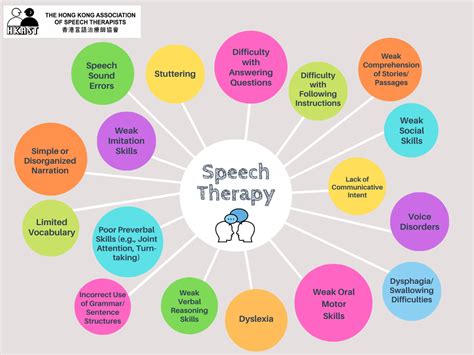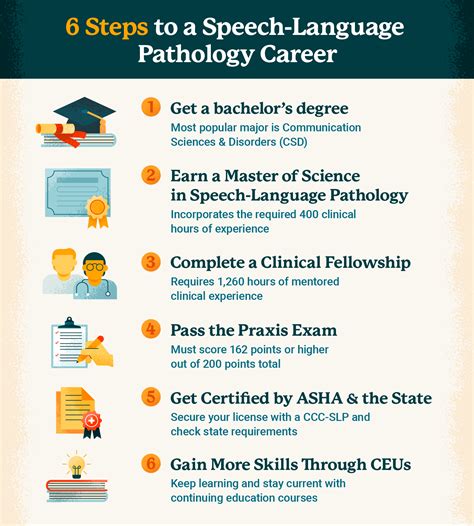Intro
Unlock a fulfilling career as a Speech Language Therapist, helping individuals overcome communication and swallowing disorders. Discover the rewards of this profession, from improving patients quality of life to advancing your skills in assessment, intervention, and evidence-based practice. Learn about the growing demand, salary ranges, and growth opportunities in this in-demand field.
As the world becomes increasingly aware of the importance of communication and mental health, the demand for speech language therapists, also known as speech language pathologists (SLPs), continues to grow. These professionals play a vital role in helping individuals with communication and swallowing disorders, making a significant impact on their patients' quality of life. In this article, we will delve into the world of speech language therapists, exploring the benefits, working mechanisms, and steps to becoming a part of this rewarding profession.

What is a Speech Language Therapist?
A speech language therapist is a healthcare professional who specializes in the diagnosis, assessment, and treatment of individuals with communication and swallowing disorders. These disorders can result from a variety of factors, including stroke, brain injury, hearing loss, autism, and developmental delays. Speech language therapists work with patients to improve their communication skills, such as speaking, listening, reading, and writing, as well as addressing swallowing disorders.
Key Responsibilities of a Speech Language Therapist
Some of the key responsibilities of a speech language therapist include:
- Conducting assessments and evaluations to identify communication and swallowing disorders
- Developing and implementing treatment plans tailored to individual patients' needs
- Providing therapy sessions to improve communication skills, such as articulation, fluency, and comprehension
- Addressing swallowing disorders and providing strategies for safe eating and drinking
- Collaborating with other healthcare professionals, such as physicians, occupational therapists, and psychologists, to provide comprehensive care
- Educating patients, families, and caregivers on communication strategies and techniques
Benefits of a Career as a Speech Language Therapist
A career as a speech language therapist offers numerous benefits, including:
-
Personal Satisfaction
Seeing patients make progress and achieve their communication goals is incredibly rewarding, making this career path highly fulfilling. -
Job Security and Growth
The demand for speech language therapists is increasing, driven by an aging population and growing awareness of communication disorders. -
Variety and Flexibility
Speech language therapists work with diverse patient populations, from children to adults, and in various settings, including schools, hospitals, and private practices. -
Opportunities for Specialization
Speech language therapists can specialize in areas such as autism, stuttering, or swallowing disorders, allowing for a deeper understanding and expertise in specific areas.

Steps to Becoming a Speech Language Therapist
To become a speech language therapist, follow these steps:
-
Earn a Bachelor's Degree
While a specific undergraduate major is not required, courses in communication sciences and disorders, linguistics, and psychology can be beneficial. -
Pursue a Graduate Degree
A master's or doctoral degree in speech language pathology is necessary for certification and licensure. -
Complete Clinical Experience
Gain practical experience through internships, practicum, or volunteer work in speech language pathology settings. -
Obtain Certification and Licensure
The American Speech-Language-Hearing Association (ASHA) offers certification, and many states require licensure to practice. -
Maintain Certification and Licensure
Complete continuing education requirements to stay certified and licensed, ensuring ongoing professional development.

Working Mechanisms of a Speech Language Therapist
Speech language therapists use a variety of techniques and strategies to help patients achieve their communication goals. Some of these mechanisms include:
-
Assessment and Evaluation
Speech language therapists use standardized tests, observations, and interviews to identify communication and swallowing disorders. -
Treatment Planning
Based on assessment results, speech language therapists develop individualized treatment plans, setting specific goals and objectives. -
Therapy Sessions
Speech language therapists provide therapy sessions, using techniques such as articulation therapy, language therapy, and swallowing therapy. -
Collaboration and Education
Speech language therapists work with other healthcare professionals, patients, and families to provide comprehensive care and education.

Conclusion
A career as a speech language therapist offers a rewarding path ahead, filled with personal satisfaction, job security, and opportunities for growth and specialization. By understanding the benefits, working mechanisms, and steps to becoming a speech language therapist, individuals can embark on a fulfilling career, making a meaningful difference in the lives of those with communication and swallowing disorders.

We invite you to share your thoughts and experiences related to speech language therapy in the comments below. If you have any questions or would like to learn more about this rewarding career path, please don't hesitate to ask.
What is the average salary for a speech language therapist?
+The average salary for a speech language therapist varies depending on factors such as location, experience, and setting. According to the Bureau of Labor Statistics, the median annual salary for speech language pathologists was $80,500 in May 2020.
Do speech language therapists work with children or adults?
+Speech language therapists work with individuals of all ages, from children to adults. Some speech language therapists specialize in working with specific age groups, such as pediatric or geriatric populations.
What are the most common communication disorders treated by speech language therapists?
+Speech language therapists treat a variety of communication disorders, including articulation disorders, language disorders, stuttering, and swallowing disorders. They also work with individuals with autism, hearing loss, and other conditions that affect communication.
